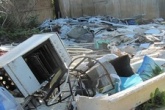Waste crime ‘is the new narcotics’ says EA chief
“Waste is the new narcotics”, the Chief Executive of the Environment Agency (EA) has said, as the environmental regulator reported that nearly 1,000 illegal waste sites were closed down last year.
The statement came as the EA published a report detailing the waste industry’s environmental performance, creation of pollution and illegal waste. The report states that 989 illegal waste sites were closed in 2015/16 and that the number of poor-performing sites fell by 20 per cent from 2014 to 2015. More than half of the illegal waste sites found by the EA in 2015 were stopped within 90 days, ‘more than ever before’.
The report states that 989 illegal waste sites were closed in 2015/16 and that the number of poor-performing sites fell by 20 per cent from 2014 to 2015. More than half of the illegal waste sites found by the EA in 2015 were stopped within 90 days, ‘more than ever before’.
And though the Environmental Services Agency (ESA) has said that the agency’s focus on waste crime is beginning to show a ‘return on investment’, the EA’s chief Sir James Bevan told the Guardian that the quick, community-damaging profits being made by waste criminals “feels… like drugs felt in the 1980s”.
He explained: “The system hadn’t quite woken up to the enormity of what was going on and was racing to catch up… We are clear now about the damage waste crime does to communities and to the economy.
“The strategy is to work with the good guys and really nail the bad guys. We are both finding more [illegal sites] and nailing more. As the statistics show, we haven’t cracked it yet and it will be a long grind, but we are making progress.”
 Sir James Bevan says "waste is the new narcotics"
Photo: Environment Agency
Action clamping down on ‘simple’ waste crime businesses
Sir James Bevan says "waste is the new narcotics"
Photo: Environment Agency
Action clamping down on ‘simple’ waste crime businesses

According to the ESA, which is running a year-long campaign aiming to make businesses more aware of their obligations to handle waste responsibly, waste crime diverts up to £1 billion from legitimate businesses and the Treasury each year. Last year, the EA was given an extra £4.2 million to address the issue, focusing on tackling illegal waste sites, illegal waste exports, poorly performing sites and those who misdescribe waste to evade taxation.
Through this work, the agency says that it found over 1,000 new illegal waste sites in 2015/16, stopping illegal waste activity at 989, 73 of which it says subsequently brought their activities into regulation. At the end of this March, it recorded 622 illegal waste sites as still active.
It also estimates that illegal exports of waste electrical and electronic equipment (WEEE) and household waste fell by 17 per cent between 2014 and 2016 with a net benefit to the UK economy of £2.75 million.
As part of efforts to combat waste crime, magistrates have been encouraged to impose harsher sentences, and in the last few weeks, a repeat offender was sentenced to 30 weeks in prison after illegally depositing waste in a small plot of land in Hampshire, leading to a number of fires that caused damage to adjacent units, while a West Sussex-based waste criminal who was caught at Heathrow whilst fleeing prosecution from the EA was given a 12-month sentence and fined £3,000 after illegally stockpiling 1,200 tonnes of waste wood.
Bevan told the Guardian: “[Waste crime] attracts criminals because you can make a lot of money. The business model is very simple: you lease or find a bit of land, you then go and offer to remove skip loads of waste for a customer, which you dump on the land. All your money is made up front, in cash, and then you disappear.”
‘Not the time to take the foot off the gas’
Responding to the report, the ESA’s Head of Regulation, Sam Corp, said that the organisation is pleased with the investment on tackling waste crime, much of which has come out of the Landfill Communities Fund, but that the extent of the action required shows what a large problem illegal sites still pose to communities and the environment across the country.

“However, the fact that nearly 1,000 new illegal sites are being found year on year shows the sheer scale of the problem and it is clear that now is not the time to take the foot off the gas. Tackling waste crime must remain a priority for government and regulators as it does for ESA and its members.”
Harvey Bradshaw, Executive Director for Environment and Business at the EA, said: “The EA will continue to take swift action to protect the environment, raise standards of poor performers and use new techniques to disrupt illegal activity.
"We urge businesses to do even more; in some sectors pollution is still having an impact on our air, land and water, and the EA will continue to work with industry groups to encourage good practice.
“This report highlights some significant improvements in the environmental performance of regulated businesses – which directly benefits people, the environment and the economy. Over the longer term, these trends have been significant, and will provide a lasting legacy to the environment, as well as real financial savings to businesses.”
The Environment Agency’s report into the waste industry can be downloaded from its website.









